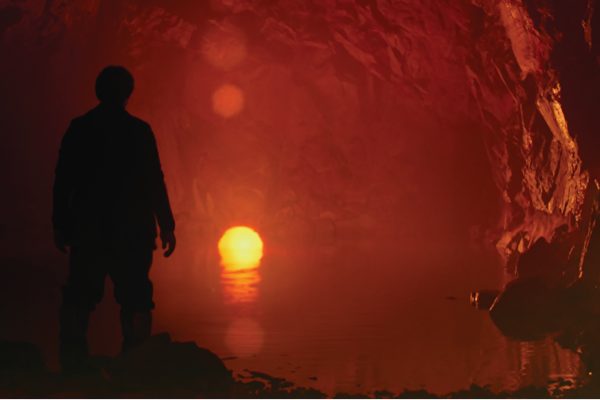Abel Ferrara is no stranger to making films about isolated protagonists slowly going nuts (Driller Killer, Bad Lieutenant), and his frequent collaborator Willem Dafoe is certainly not averse to starring in them (Antichrist, The Lighthouse; he’s even played van Gogh). So, the two collaborating on a movie in which an isolated man slowly unravelling should a perfect meeting of mind and muse. Not necessarily. Ferrara has been particularly keen lately to hang conventional narrative and focus on image and mood; like later period Terrence Malick, if Malik concerned himself with damnation instead of ascension. Dafoe is a habitually fearless actor who is willing to go as far as necessary and beyond. Siberia is what happens when no restraining force is applied to either.
What story applies here takes place in a frozen tundra where Dafoe’s Clint runs the bar at the edge of the world. In between serving a variety of people – sharing no common language with some of them – he is haunted by memories of his past and experiences intense and surreal vision. Whether his isolation is imposed by circumstance or if he has come to this place to die is unclear. And it really doesn’t matter.
Siberia exists at the convergence of a strange Venn diagram between Jack London, Carl Jung, and Lars von Trier, with a hint of the weird ethnography of Herzog’s Cobra Verde. Ferrara has described it as an attempt to successfully transfer dreams to film. Somewhere amid the flurry of images he may have been successful. There are enough ideas that may bear further investigation individually. What we do know is that the dreams of other people are rarely as interesting to the viewer or listener as they are to the dreamer. What we can perhaps gather is that Ferrara is rather mundanely focused on love, sex, and death. Principally sex.
Dafoe does his best, and his craggy charisma does enough to carry the viewer through the more unbearable sections. He has more than enough gravitas to power through such indignities as being slathered in shaving foam to play his father. Ferrara doesn’t help him with Clint’s frequent narration packed with gnomic utterances, and some inane dialogue with the various denizens of his past he encounters. Dafoe is on more solid ground with Clint’s erotic adventures. The actor has been involved in some of the more memorable bedroom scenes of recent decades, and he gets a few more here. These include a spectacularly graphic bout with an ex (Dounia Sichov), and a more lingering, eerier snuggle with a heavily pregnant Siberian woman (Cristina Chiriac), who lures him into bed with the assistance of her crooning, gnarled old babushka.
One moment that cuts through the Proustian rambling is Clint’s dance to Del Shannon‘s ‘Runaway‘. It is one of the rare instances where all self-conscious baggage is stripped away and Ferrara taps into an untarnished stream of emotion. It is also one of the few moments that an audience is likely to connect with, and where the sense of nostalgia becomes heady and palpable.
These moments are too few and far between and before long it feels like we’re as exposed as the titular region in the face of Ferrara’s muddled solipsism. Despite some occasionally interesting imagery, Siberia is too hamstrung by a terrible script that jumbles words into a meaningless gumbo. ‘Just because you can’t understand it, doesn’t mean it cannot be,’ is intoned solemnly at one point. It might be prudent at this point to paraphrase that more admirably direct sage, Dr Ian Malcolm: ‘You were so preoccupied with whether or not you could, you didn’t stop to think if you should.’
Screening as part of BFI London Film Festival Sat 10 Oct 2020
